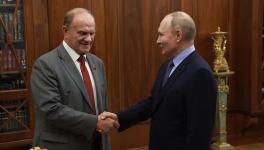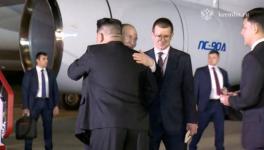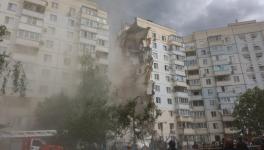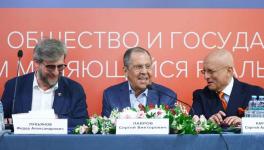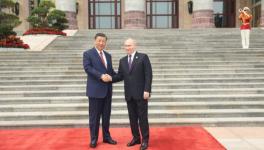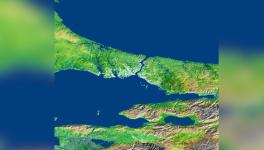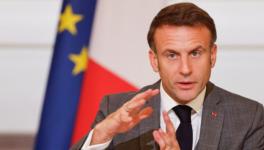Context and Intent of Russia’s War on Ukraine
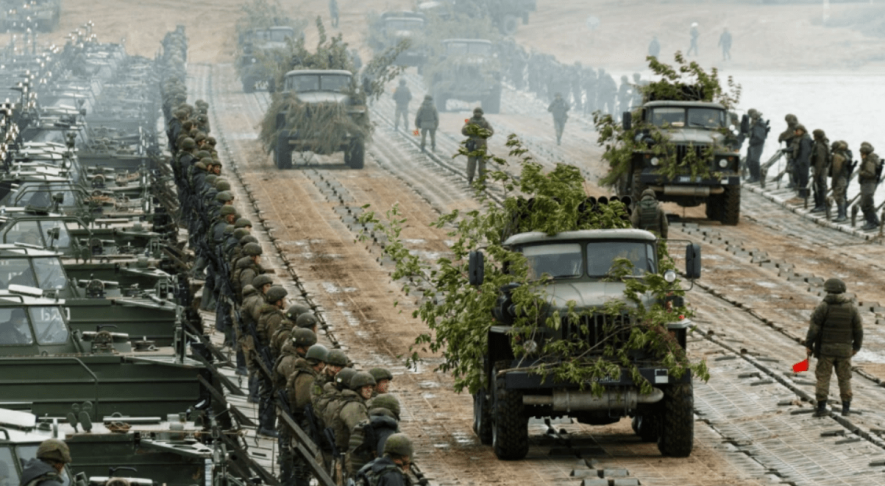
Image for representational purpose.
Every war has a context, the prior flow of events and processes which propel adversaries towards a physical clash. However, the existing context does not morph into a war as an unproblematic, smooth outcome. There will be no war without someone planning it and going for it. War brings a qualitative shift in its context; something that exists ends, and something new emerges. Within the limits of their underlying and surrounding contexts, all qualitative breaks are chaotic, their outcomes uncertain. Wars are no exception. It makes them crucially dependent upon the agency, abilities and world-views of chief combatants.
The war in Ukraine is more than two weeks old, and its definitive outcome is still in future. Among all the wars of the post-Cold War era, this one has the potential to alter the world we live in fundamentally. Hence, it is not surprising that it is producing sharply polarised reactions. These positions emerge from a selective emphasis on the context or intent behind this war. Western regimes, imperialist media, liberal intellectuals and ruling elites of many countries focus on the intention. In a neat moral fable, it is presented as arising solely from the evil designs of Russia, or more narrowly of its president Vladimir Putin, and is presented as a fight of a valiant David against a rampaging Goliath. The context of the war is completely missing in this caricature.
On the other hand, the Russian government, active and passive supporters of Russia and Putin, and sections of the anti-imperialist left emphasise the context of the war, presenting it as an inevitable outcome of what was happening before. These either/or frameworks are not only self-limiting but also fail to notice what exactly is at stake in this conflict.
Excellent analyses are available about the diverse aspects of the context of the war. John Mearsheimer sees it in the light of a great-power dynamic, as understood by the realist school of international relations. An implicit assumption of a similar dynamic lies behind all explanations (including the Russian government’s), which present the Western alliance’s relentless disregard of the Russian opposition to the expansion of NATO up to its borders. In Mershemier’s words, the western US-led coalition has poked the bear in its eye. Russia, a great power, is bound to react rather than submit quietly. According to Vijay Prashad, the war did not start in Feb 2022 but in 2014, when Ukrainian right-wing militia attacked ethnic Russians in Donbas after the success of the Maidan coup. The civil war there has claimed more than 14,000 lives. The persecution of the Russian minority in Ukraine and the hold of the extreme right-wing in the post-2014 Ukrainian state provide the political context of the war.
Big Western Imperialism Elephant in World Room
Discussions on the expansion of NATO in Eastern Europe and decisions of Western governments after Russia raised a red flag often miss the unipolar imperial context of these actions. Was the disregard of almost all Western countries to the security guarantee treaties proposed by Russia only misjudgment or stupid arrogance? Else, is it just how Western countries see their place vis a vis other countries? Was the expectation of a different response from Western powers, which Russians seemingly hoped, a misplaced expectation? After all, if the purpose of NATO expansion was to encircle Russia, it made little sense to stop or reverse it just because the target began protesting.
While the great-powers framework views the world in terms of the plurality of powers, that is not how the world appears to the unipolar imperial metropole vision. For the latter, the world has only two types of countries; those of the metropole and those outside. To rulers of the metropole, the latter group are fundamentally inferior. The metropole decides in its interests how to treat them. They cannot demand how they should be treated. This is the crux of the Western imperial ideology and world-view. If the western alliance poked the Russian bear, the Russian attack on Ukraine is a slap on the face of imperial self-image. This partially explains the frenzied blood-lust of the "sanctions from hell" on Russia.
How much does the imperial West’s world-view match with the actual reality? Neo-liberal capitalism, which first emerged in the core Western countries in the 1980s, and spread worldwide after the collapse of the Soviet Union, is now a global political-economic order. It has emerged under the hegemony of the Western capitalist countries through their control over technology, international finance, institutions like the World Bank, IMF, and WTO, their vast global NGO network, and war-making abilities. The imperial West around the North Atlantic and their close allies, Japan, South Korea and Australia, have about 12% of humanity. They spend more than 56% of the global expenditure on arms and armaments. The United States alone, with 4.2 % of the world’s people, spends 40% of this. The combined GDP of these countries in nominal dollars terms is about 50% of global GDP. Even more dominant is their position in world finance. More than 80% of the foreign currency reserves of central banks of all countries are in dollars and euros.
Conflicts and wars are integral to the current global system because the Western imperial countries are determined to maintain domination. After Russia’s war on Ukraine, the West presents itself as a champion of national sovereignty and international law, but NATO or its members have actively participated in all major conflicts of the past three decades. Almost all western countries and NATO members have joined in attacks on Yugoslavia, Iraq, Afghanistan, Libya, and Syria. Other countries whose governments refuse to toe the line, in Cuba, Venezuela, or Iran, have been made to suffer economic sanctions and destabilisation campaigns. The western imperial countries routinely flout international norms and treaties.
The fate of the JCPOA with Iran, unilaterally wrecked by the United States, is the most recent example. The bombing of Yugoslavia and Libya were against international law. The no-fly zone mandated by the United Nations in the latter case, which was a defensive measure, was blatantly used by Western countries to bomb the country. The reasonable Minsk-2 agreements of 2015 for a federated Ukraine with internal security for its ethnic Russian citizens would have removed an essential context for the current conflict, but it suffered the same fate. While the United States egged on the Ukrainian regime to never implement these in good faith, France and Germany, parties to these agreements, had neither the strategic vision nor guts to stand up to the United States.
Two political levers of the western imperial hegemony receive little attention but need emphasis. First, the imperial world domination project enjoys widespread support in the countries of the metropolis due to how popular politics and culture evolved over centuries of colonial rule. Despite significant anti-war movements, particularly against the war in Iraq, the moral fabric of these societies accepts imperial interventions in other countries and societies. Leaders who start such interventions are almost always re-elected. The second political fact is that the privileged sections of nearly all countries are economically, politically and culturally invested in the Western imperial project. We see this in the ease with which ruling elites accept the representation of the rest of the world in western media and academia. For example, the Indian English press routinely and solely sources news items about the war on Ukraine from the West. Even the reaction of the associations of the Arab and African journalists to the racism of the coverage in Western media received little attention in India.
Elite integration into the West is a product of the neo-liberal political economy, which has sharpened class differences within countries and increased the global movement of labour and professional strata.
Beyond Unipolarity
The Western imperial domination of the past three decades has lately seen economic and military challenges. The Russian military intervention in Syria in 2015 against western plans to topple the Assad regime was a watershed event. It showed that western imperialism cannot take its military domination of the world for granted. The industrialisation of China, India, Brazil, and Indonesia and their economic rise have reduced imperial countries’ relative economic weight. In purchasing power parity terms, the share of the imperial West and its allies drops to 34% of global output. The Chinese economy is already 20% bigger than the United States. Its BRI programme is an important international intervention.
If the unipolar phase began after the USSR disintegrated, the current trend is rising multipolarity. This characterisation, however, says little about the politics and ideology of the change. This time, the challenge to Western imperialism is fundamentally different from the anti-colonial struggles before and after the Second World War. The desire for national autonomy motivated all those struggles; many were animated by concrete programmes to regenerate the national economy and culture. Many adopted class-based socialist programmes of resource redistribution and economic development. But this time, the challenge lacks popular political mobilisation and an alternate vision for a better world.
Putin’s War
Western imperial interventions in Eastern Europe prepared the ground for a military conflict. A politically sagacious regime in Russia would have realised that the actual issue is not a military threat but Western efforts to corner Russia politically. When and how the Putin government decided to resolve the conflict militarily is moot. The Russian leadership clearly sees the war from a solely nationalist perspective. Furthermore, this perspective is limited to the security interests of the Russian nation-state and gives little space to the national aspirations of the Russian people.
If western imperialism arrogantly dismissed the great power status of Russia, the latter got deluded into not noticing that the central conflict against western imperialism would be political rather than military. Hence, rather than seeing the encirclement of Russia as part and parcel of the phenomenon that led to the destruction of Yugoslavia, Libya, Afghanistan and Syria, and trying to generate international political opinion against western aggression, the Russian government has been chiefly motivated by opportunities offered by the military logic of the situation.
It was becoming apparent that with or without NATO membership, the Ukrainian state was militarily integrating with the United States and NATO countries. In November 2021, it became a strategic partner of the United States. In July 2021, it participated in the Three Swords military exercises with NATO members Lithuania and Poland. Diplomatic efforts to make it implement the Minsk-2 accords or European powers to agree to a security architecture for the continent were also reaching a dead end. Even the bluff of amassing large forces on the Ukrainian border to force diplomacy yielded no result. Russian military strategists would have surmised a narrow window to achieve military victory over Ukraine at a low cost. If it closed, strengthened Ukrainian forces could force a military solution to the civil war in Donbas and offer their country to Western powers for overt and covert operations against Russia. Such calculations may turn out to be correct—or not. However, the Putin regime failed to exploit the political contradictions created by Ukrainian state policies. The civil war in Donbas was seen only in military terms. It attempted no programme of popular politics against anti-Russian minority policies of the Ukrainian state and its embedded Nazi elements. No effort was made to bring together all Ukrainians who opposed their country becoming an outpost of Western machinations against Russia.
This lack of political imagination is not incidental but a by-product of the nature of the Putin government. He enjoys high ratings among his people, but his regime is culturally conservative, economically neo-liberal and politically authoritarian. In brief, Western imperial aggression in Eastern Europe readied the ground for conflict, but Putin’s government was ideologically oriented to resolve it militarily.
The war in Ukraine results from the worst features of the current world order. Western imperial machinations, a client regime in Kyiv eager to serve its imperial handlers without regard to national interests, and an authoritarian Russian state have brought this catastrophe to the people of Ukraine. Humiliated and wounded imperialism will extract the maximum price from Russia and not leave the rest of the world in peace. It will trample upon the sovereignty of other countries and will try to force them to toe its line on sanctions on Russia. That is how it wrecked the economies of Cuba, Venezuela and Iran. Will it succeed in Russia and get the world back in its grip? That is unlikely. The world seems too big and diverse for imperial threats to work.
Putin may win this war but at the cost of his global standing and will possibly suffer the same fate within Russia. While the main actors of this war will live with the debris of their actions, the world’s people have a bigger worry: What will be the nature of the new world order that this war augurs?
The author teaches Physics at St Stephen’s College, Delhi. The views are personal.
Get the latest reports & analysis with people's perspective on Protests, movements & deep analytical videos, discussions of the current affairs in your Telegram app. Subscribe to NewsClick's Telegram channel & get Real-Time updates on stories, as they get published on our website.












